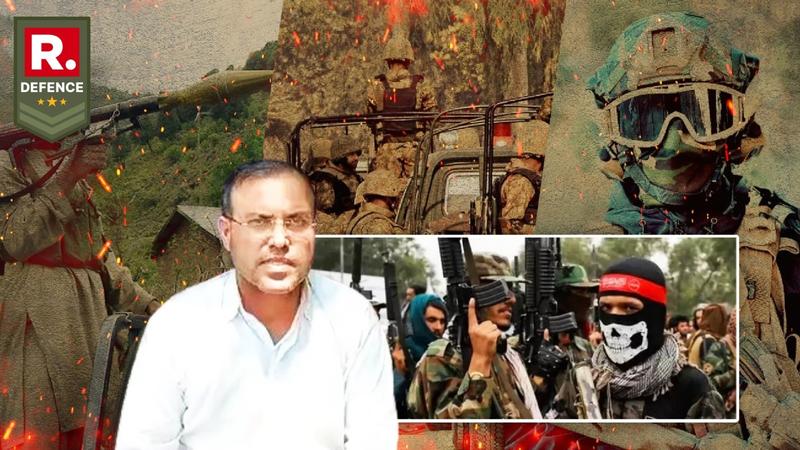Published 14:05 IST, September 4th 2024
TTP’s Abduction of Pakistani Lt Colonel Highlights the Irony of Pakistan’s Counter Terrorism Efforts
The recent abduction and subsequent release of Pakistani Lieutenant Colonel Khalid Ameer and his relatives by TTP underscores Pakistan's deepening crisis.

Dera Ismail Khan, Pakistan – The recent abduction and release of a serving Pakistani Lieutenant Colonel and his relatives by the Tehreek-e-Taliban Pakistan (TTP) underscores a stark reality: Pakistan is grappling with an insurgency that is, in many ways, of its own making. The nation, long accused of nurturing and supporting terrorism for strategic purposes, now finds itself ensnared in a deadly conflict with the very forces it once sought to control.
The kidnapping occurred in Dera Ismail Khan, a district in Khyber Pakhtunkhwa known for its history of militancy and unrest. The abduction took place on Wednesday evening when Lt Col Khalid Ameer and his family members were attending their father's funeral at a mosque in their hometown, Mohalla Khadr Khel. The armed militants from the outlawed TTP stormed the mosque and forcibly took the officer and his relatives—his brothers Asif Ameer, a senior civilian security officer, and another brother, along with a nephew—into captivity.
A Crisis Born of Misguided Policies
Pakistan’s strategy of fostering militant groups for leverage in regional conflicts has backfired spectacularly. The TTP, an offshoot of the Afghan Taliban, emerged as a significant threat in the early 2000s, following Pakistan's military incursions into the tribal areas. These incursions were initially aimed at combating foreign militants fleeing the U.S.-led invasion of Afghanistan, but they also sowed the seeds of a domestic insurgency.

The military’s operations in South Waziristan and other tribal areas were met with fierce resistance from local tribesmen who viewed the presence of Pakistani troops as an attempt to subjugate them. The TTP capitalized on this discontent, transforming it into a full-blown insurgency against the Pakistani state. The group has since carried out countless attacks on security forces and civilians, turning areas like Dera Ismail Khan into battlegrounds.
The Abduction: A Grim Reminder of Pakistan’s Terrorism Quagmire
The recent kidnapping of Lt Col Khalid Ameer and his relatives from a mosque in Dera Ismail Khan highlights the deep-rooted nature of the insurgency. The TTP’s ability to abduct high-profile military personnel from a secured area underscores the group’s continued strength and the Pakistani state’s inability to fully control the territories it claims to govern.
The TTP, which claimed responsibility for the abduction, released a video showing Lt Col Ameer and his brother, Asif Ameer, in captivity. In the video, Lt Col Ameer stated, “We are safe and well and in the custody of the Taliban in a remote area where the Pakistani government has no control,” a damning admission of the state’s limited reach.

The eventual release of the hostages, secured through the intervention of tribal elders and local notables, further illustrates the complexity of Pakistan’s internal dynamics. The reliance on tribal negotiations rather than state power to secure the release of military personnel reflects the weakening authority of the Pakistani government in its territories.
This incident is not an isolated one but part of a broader pattern where the Pakistani state is forced to negotiate with insurgent groups it once supported. The TTP, which continues to operate with impunity in regions like Khyber Pakhtunkhwa, was originally bolstered by Pakistan’s own policies. Now, these militants have turned their guns on the very state that once sheltered them.
The TTP: Pakistan's own Frankenstein
The TTP’s origins are deeply intertwined with Pakistan’s long-standing policy of using militant groups as proxies in regional conflicts, particularly in Afghanistan and Kashmir. By providing sanctuary and support to various militant factions, Pakistan aimed to exert influence over its neighbours. However, these groups, including the TTP, have increasingly targeted Pakistan itself, leading to a situation where the state is under siege from within.

Recent reports, including those from the United Nations, have highlighted the continued presence of the TTP in Afghanistan, where they are trained and equipped in al-Qaida-run camps. The reports contradict Taliban officials’ denials of the TTP’s presence in Afghanistan, instead labelling the group as the largest terrorist organization in the region.
The Pakistani Taliban’s ability to carry out cross-border attacks from Afghanistan further complicates Pakistan’s security situation. The insurgency has morphed into a transnational threat, with Pakistan’s own policies contributing to the instability in the broader region.
A Tragic Cycle of Violence
The abduction and subsequent release of Lt Col Khalid Ameer and his relatives is just the latest chapter in Pakistan’s ongoing struggle with the TTP. Despite efforts to control the insurgency through military operations and negotiations, the TTP remains a potent force, capable of challenging the state’s authority.

The cycle of violence in Pakistan’s tribal areas is a direct consequence of the state’s historical support for militancy. What began as a strategy to achieve strategic depth in Afghanistan and counter Indian influence in Kashmir has spiralled into a domestic nightmare. The TTP, once seen as a tool of foreign policy, has become a deadly adversary, threatening the very fabric of the Pakistani state.
The release of Lt Col Khalid Ameer and his relatives, while a relief for their families, does little to change the grim reality that Pakistan is facing an insurgency of its own making. The TTP, empowered by the very policies Pakistan once embraced, continues to wreak havoc within the country. The state’s reliance on tribal negotiations to secure the release of its own officers is a stark indicator of its diminished control and authority in regions like Khyber Pakhtunkhwa.
Updated 16:02 IST, September 4th 2024




